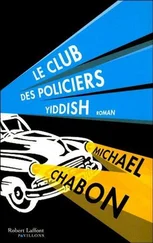Michael Chabon - The Yiddish Policemen's union
Здесь есть возможность читать онлайн «Michael Chabon - The Yiddish Policemen's union» — ознакомительный отрывок электронной книги совершенно бесплатно, а после прочтения отрывка купить полную версию. В некоторых случаях можно слушать аудио, скачать через торрент в формате fb2 и присутствует краткое содержание. Жанр: Альтернативная история, Полицейский детектив, на английском языке. Описание произведения, (предисловие) а так же отзывы посетителей доступны на портале библиотеки ЛибКат.
- Название:The Yiddish Policemen's union
- Автор:
- Жанр:
- Год:неизвестен
- ISBN:нет данных
- Рейтинг книги:5 / 5. Голосов: 1
-
Избранное:Добавить в избранное
- Отзывы:
-
Ваша оценка:
- 100
- 1
- 2
- 3
- 4
- 5
The Yiddish Policemen's union: краткое содержание, описание и аннотация
Предлагаем к чтению аннотацию, описание, краткое содержание или предисловие (зависит от того, что написал сам автор книги «The Yiddish Policemen's union»). Если вы не нашли необходимую информацию о книге — напишите в комментариях, мы постараемся отыскать её.
The Yiddish Policemen's union — читать онлайн ознакомительный отрывок
Ниже представлен текст книги, разбитый по страницам. Система сохранения места последней прочитанной страницы, позволяет с удобством читать онлайн бесплатно книгу «The Yiddish Policemen's union», без необходимости каждый раз заново искать на чём Вы остановились. Поставьте закладку, и сможете в любой момент перейти на страницу, на которой закончили чтение.
Интервал:
Закладка:
Despite the agricultural palaver, the modest homesteads and farm cooperatives proposed by the Sitka Settlement Corporation never materialized. Japan attacked Pearl Harbor. The Interior Department’s attention wandered toward more pressing strategic concerns, such as oil reserves and mining. At the conclusion of their term at “Ickes College,” the Shemets family, like most of their fellow refugees, were kicked loose to fend for themselves. Just as Delegate Dimond had predicted, they drifted up to the raw, newly booming town of Sitka. Hertz studied criminal justice at the new Sitka Technical Institute and, on graduating in 1948, was hired as a paralegal by the first big U.S. law firm to open a branch office here. His sister, Freydl, Landsman’s mother, was among the earliest Girl Scouts in the settlement.
Nineteen forty-eight: Strange times to be a Jew. In August the defense of Jerusalem collapsed and the outnumbered Jews of the three-month-old republic of Israel were routed, massacred, and driven into the sea. As Hertz was starting his job at Foehn Harmattan amp; Buran, the House Committee on Territories and Insular Affairs began a long-delayed review of status called for by the Sitka Settlement Act. Like the rest of Congress, like most Americans, the House Committee was sobered by grim revelations of the slaughter of two million Jews in Europe, by the barbarity of the rout of Zionism, by the plight of the refugees of Palestine and Europe. At the same time, they were practical souls. The population of Sitka Settlement had already swollen to two million. In direct violation of the act, Jews had spread up and down the western shore of Baranof Island, out to Kruzof, all the way up to West Chichagof Island. The economy was booming. American Jews were lobbying hard. In the end, Congress granted the Sitka Settlement “interim status” as a federal district. But candidacy for separate statehood was explicitly ruled out. NO JEWLASKA, LAWMAKERS PROMISE, ran the headline in the Daily Times. The emphasis was always on the word “interim.” In sixty years that status would revert, and the Sitka Jews would be left once again to shift for themselves.
One warm September afternoon not long after, Hertz Shemets was walking down Seward Street, prolonging his lunch break, when he bumped into his old chum from Lodz, Isidor Landsman. Landsman’s father had just arrived in Sitka, alone, aboard the Williwaw, fresh from a tour of the death and DP camps of Europe. He was twenty-five, bald, and missing most of his teeth. He was six feet tall and weighed 125 pounds. He smelled funny, talked crazy, and had outlived his entire family. He was oblivious to the raucous frontier energy of downtown Sitka, the work crews of young Jewesses in their blue head scarves, singing Negro spirituals with Yiddish lyrics that paraphrased Lincoln and Marx. The lively stench of fish flesh and felled tree and turned earth, the rumble of the dredgers and steam shovels grading mountains and filling in Sitka Sound, none of it seemed to touch him. He walked with his head down, a hunch in his shoulders, as if only burrowing through this world on his inexplicable way from one strange dimension to the next. Nothing penetrated or illuminated the dark tunnel of his passage. But when Isidor Landsman realized that the grinning man, hair slicked, shoes like a couple of Kaiser automobiles, smelling of the grilled-onion cheeseburger he had just consumed at the lunch counter of Woolworth’s, was his old friend Hertz Shemets from the Makkabi Youth Chess Club, he lifted his eyes. The eternal kink went out of his shoulder. He opened his mouth and closed it again, speechless with outrage, joy, and wonder. Then he burst into tears.
Hertz took Landsman’s father back to Woolworth’s, bought him lunch (an egg sandwich, his first milk shake, a decent pickle) and then led him down to Lincoln Street, to the new Hotel Einstein, in whose cafe the great exiles of Jewish chess met every day to demolish one another without pity or heart. Landsman’s father, half demented at this point by fat, sugar, and the lingering ill effects of typhus, mopped up the room. He took on all comers and sent them out of the Einstein so soundly thrashed that one or two of them never forgave him.
Even then he displayed the mournful, agonized style of play that helped ruin the game for Landsman as a child. “Your father played chess,” Hertz Shemets once said, “like a man with a toothache, a hemorrhoid, and gas.” He sighed, he moaned. He tugged in fits at the patchy remnant of his brown hair, or chased it with his fingers back and forth across his pate like a pastry chef scattering flour on a marble slab. The blunders of his opponents were each a separate cramp in the abdomen. His own moves, however daring, however startling and original and strong, struck him like successive pieces of terrible news, so that he covered his mouth and rolled his eyes at the sight of them.
Uncle Hertz’s style was nothing like that. He played calmly, with an air of unconcern, keeping his body at a slight angle to the board, as if expecting very shortly to be served a meal or to take a pretty girl onto his lap. But his eyes saw everything, the way they’d seen the telltale tremor in Tartakower’s hand that day at the Makkabi Youth Chess Club. He took in his reversals without alarm and his chances with a faint air of amusement. Smoking Broadways end on end, he watched his old friend squirm and mutter his way through the assembled geniuses of the Einstein. Then, when the room was laid to waste, Hertz made the necessary move. He invited Isidor Landsman home.
In the summer of 1948, the Shemets family lived in a two-room apartment in a brand-new building on a brand-new island. The building was home to two dozen families, all of them Polar Bears, as the first-wave refugees called themselves. The mother slept in the bedroom, Freydl got the sofa, and Hertz made his bed on the floor. By now they were all staunch Alaskan Jews, which meant they were utopians, which meant they saw imperfection everywhere they looked. A barb-tongued and quarrelsome family, in particular Freydl Shemets, who at fourteen already stood five feet eight inches tall and weighed 110 kilograms. She took one look at Landsman’s father, hovering uncertainly in the doorway of the apartment, and correctly diagnosed him to be as unreclaimable and inaccessible as the wilderness that she had come to regard as her home. It was love at first sight.
In later years it was tough for Landsman to get much out of his father about what if anything he had seen in Freydl Shemets. She was not a bad-looking girl. Egyptian-eyed, olive-skinned, in her short pants, hiking boots, and the rolled sleeves of her Pendleton shirt, she exuded the old Makkabi movement spirit of mens sana in corpore sano. She pitied Isidor Landsman deeply for the loss of his family, for the suffering he had endured in the camps. But she was one of those Polar Bear kids who handled their own feelings of guilt at having escaped the filth, the starvation, the ditches and killing factories by offering survivors a constant stream of advice, information, and criticism disguised as morale boosting. As if the choking, low-hanging black pall of the Destruction could be lifted by one determined kibitzer.
That first night Landsman’s father slept, with Hertz, on the floor of the Shemets apartment. The next day Freydl took him shopping for clothes, paying for them out of her own bat mitzvah nest egg. She helped him rent a room from a recent widower who lived in the building. She massaged his scalp with an onion, in the belief that this would cause his hair to renew itself. She fed him calf liver for his tired blood. For the next five years, she nudged and badgered and bullied him until he sat up straight, made eye contact when speaking, learned American, and wore dentures. She married him the day after she turned eighteen, and got a job at the Sitka Tog, working her way up through the women’s page to features editor. She worked sixty to seventy-five hours a week, five days a week, until her death from cancer, when Landsman was in college. During that time Hertz Shemets impressed the American lawyers at Foehn Harmattan so much that they took up a subscription and pulled the strings they needed to pull to send him to law school in Seattle. He later became the first Jew hired by the Sitka detail of the FBI, its first district director, and eventually, having caught Hoover’s eye, ran the Bureau’s regional counterintelligence program.
Читать дальшеИнтервал:
Закладка:
Похожие книги на «The Yiddish Policemen's union»
Представляем Вашему вниманию похожие книги на «The Yiddish Policemen's union» списком для выбора. Мы отобрали схожую по названию и смыслу литературу в надежде предоставить читателям больше вариантов отыскать новые, интересные, ещё непрочитанные произведения.
Обсуждение, отзывы о книге «The Yiddish Policemen's union» и просто собственные мнения читателей. Оставьте ваши комментарии, напишите, что Вы думаете о произведении, его смысле или главных героях. Укажите что конкретно понравилось, а что нет, и почему Вы так считаете.












